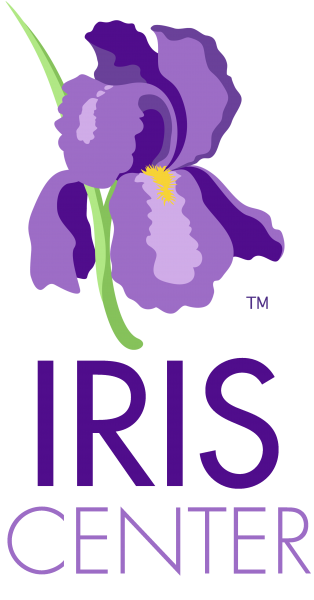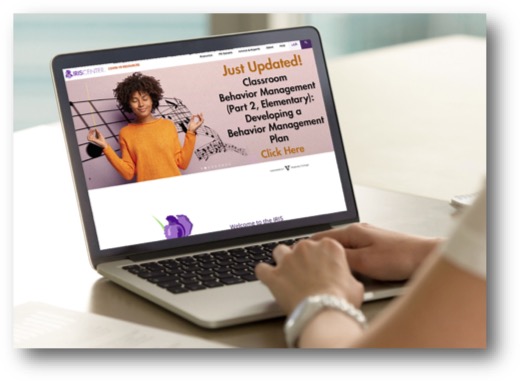By Jennifer Kiilerich
A teacher's education doesn't stop when they graduate from college and enter the classroom. Like all fields, professional development is pivotal to progress, and Vanderbilt University's IRIS Center, housed in Peabody College of education and human development, meets that need on a global scale. The organization's 2024 annual report demonstrates that its online instructional resources are making a difference for more people than ever.
 The IRIS Center has focused since 2001 on developing and disseminating free, online resources on effective, evidence-based instructional and behavioral practices. Geared toward teachers and other education professionals, independent learners and students preparing to become educators, its mission is to support the education of all students, particularly struggling learners and those with disabilities.
The IRIS Center has focused since 2001 on developing and disseminating free, online resources on effective, evidence-based instructional and behavioral practices. Geared toward teachers and other education professionals, independent learners and students preparing to become educators, its mission is to support the education of all students, particularly struggling learners and those with disabilities.
"IRIS has long been a trusted source of information," said IRIS Center director Naomi Tyler. "Particularly now, as research is identifying more effective ways to provide instruction, in reading and mathematics for example, or to proactively prevent disruptive behaviors that interfere with the learning process, there is increasing demand for quality resources that can efficiently convey this information."
Approximately 1.5 million individuals in the United States used the center's resources last year, a 15 percent increase since 2022, representing every state and territory. More than 1,500 U.S. colleges and universities looked to the IRIS Center for learning materials, along with 1,000 public school districts and all 50 state departments of education or other government offices across America. Overall, the IRIS Center was tapped by 2 million users spanning 226 countries, with a total of 23.6 million page views.
Additionally, nearly 50,000 educators set up new accounts in the IRIS Professional Development Certificate platform in 2024. This platform consists of IRIS Modules-the center's signature resource-which are interactive, self-paced learning units on key educational topics that yield an IRIS Certificate of Completion when finished. More than 176,000 certificates were accessed, a 29 percent increase from 2023, reflecting the center's most significant resource bump for the year.
Amid U.S. teacher shortages, "many districts and states have developed alternative, emergency or temporary certification options and have embedded the IRIS Certificates of Completion into their programs," said Tyler. "Our modules are valuable as districts work to provide these educators with foundational skills."
Supported by the U.S. Department of Education's Office of Special Education Programs, the IRIS Center's platform features not only modules, but also case studies, information briefs, course/professional development activities, a high-leverage practices alignment tool and an online glossary of disability-related terms. Key topics include accommodations for students with disabilities, classroom behavior management, assessment and progress monitoring, early childhood, Universal Design for Learning and more. These resources are developed in collaboration with nationally recognized researchers and education experts, including many Peabody professionals.
In 2024, IRIS calculated that its cost per user was 67 cents.
"When one considers that, for 67 cents," said Tyler, "an educator can come back to the site as many times as they want, access all the materials for free, and earn IRIS Certificates of Completion for 43 content-rich modules-totaling more than 90 clock hours-we think that's a pretty good return on our grant-funding investment."
Non-educators learned with IRIS, too
IRIS materials are impactful for future teachers and professional educators at all career stages but also meet critical needs outside of schools. More than 220 hospitals and 350 health care systems and organizations put IRIS learning modules to use last year, as did justice systems and college students in non-education majors. The U.S. Department of Education included IRIS resources in federal guidance and in a classroom practice guide for educators.
An alternate certification program instructor who completed the Family Engagement module commented that "the module's topics and resources are relevant for a variety of professionals who work with families, including educators, social workers, counselors and health care providers."
Modernizing modules
 IRIS continually improves its professional development options, pulling from the latest evidence-based knowledge about learning and behavior. In 2024, team members developed, revised or updated six key resources. They also updated many collections by making text, tables and images readable by assistive technology, creating a library of 500+ alt-text descriptions to accompany their graphics.
IRIS continually improves its professional development options, pulling from the latest evidence-based knowledge about learning and behavior. In 2024, team members developed, revised or updated six key resources. They also updated many collections by making text, tables and images readable by assistive technology, creating a library of 500+ alt-text descriptions to accompany their graphics.
On the heels of notable growth in 2024, IRIS remains a field-leading resource provider that puts the latest educational research into the hands of practitioners. College students, teachers, educational personnel and a wide range of non-education professionals benefit from its comprehensive selection of engaging, interactive modules. For additional details, the IRIS 2024 Year in Review is available online.






